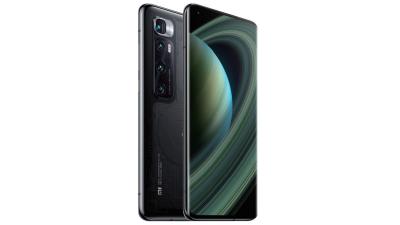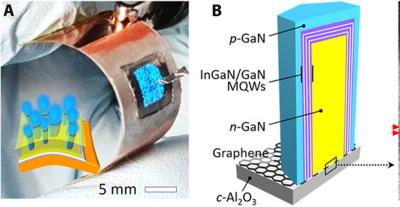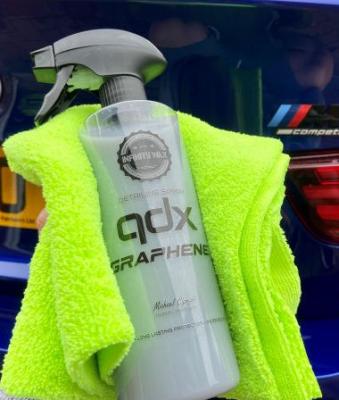The Graphene-Info newsletter, September 2020
Published: Thu, 10/01/20
Xiaomi's Mi 10 Ultra smartphone said to sport "the first mass-produced graphene Li-ion battery"
Xiaomi's upcoming smartphone, the high-end Mi 10 Ultra, will reportedly be sporting "the first mass-produced 120W graphene battery". Xiaomi claims the 4,500mAh “graphene-based lithium-ion” battery packs 1,000 times greater conductivity than traditional “carbon black” batteries. The brand was also quoted as saying that the battery remained at over 90% capacity after 800 charge and discharge cycles.
It was also said that Xiaomi implemented three cooling solutions - a graphene-copper sandwich for the chipset, RAM, storage, and modem; additional graphene sheet, combined with a copper cooling chamber with vapor underneath the front panel; and an additional highly-conductive film, sitting right between the optical fingerprint scanner and the OLED, helping to dissolve the heat across the 110 sq.cm display.
As exciting as this may sound, no details were given on the graphene battery tech, and questions remain as to the exact parameters and specific use of graphene in this battery. Hopefully things will be clearer in the near future.
Edmonton Airport to host trial of new graphene-based COVID-19 testing technology
It was recently reported that Edmonton International Airport (YEG) will host a trial for a new graphene-based COVID-19 testing technology that can produce results in seconds. The trials will be executed in partnership with GLC Medical, a subsidiary of Graphene Leaders Canada (GLC).
The test is conducted with a handheld unit that takes a saliva sample from a person and is expected to tell if someone has COVID-19 in under one minute, compared to other tests with longer laboratory-based waiting periods for results. This test promises many advantages, from its ease of use to the elimination of the nasal swab to direct virus detection.
Skeleton Technologies working on graphene “SuperBattery” for EVs, signs €1 billion LOI with a leading automotive manufacturer
Estonian startup Skeleton Technologies is reportedly developing a graphene-enhanced “SuperBattery” that can be charged in just 15 seconds, and can go through hundreds of thousands of charge-recharge cycles without degrading. It was also reported that Skeleton recently signed a €1 billion letter of intent with a leading automotive manufacturer to bring the technology to market, most likely in 2023 according to Taavi Madiberk, founder and chief executive of Skeleton.
Skeleton’s graphene-based battery is hoping to help bridge the gap where lithium-ion batteries or hydrogen fuel cells are still not quite meeting energy requirements. The company has announced a partnership with Karlsruhe Institute of Technology to complete the development. Electric cars will be a key use case, as slow recharge times are still one of the major headaches for electric vehicle owners.
Researchers use graphene to create detachable flexible microLED devices
University of Texas at Dallas researchers and their international colleagues have developed a graphene-based method to create micro LEDs that can be folded, twisted, cut and stuck to different surfaces. The research could help pave the way for the next generation of flexible, wearable technology.
The bendy micro-LEDs have a variety of possible uses, including flexible lighting, clothing and wearable biomedical devices. From a manufacturing perspective, the fabrication technique offers another advantage: Because the LED can be removed without breaking the underlying wafer substrate, the wafer can be used repeatedly.
GAC establishes graphene unit to develop fast-charging EV Tech
Chinese EV maker Guangzhou Automobile New Energy (GAC), which announced last May that it has developed a graphene-enhanced battery for EVs which will be available for mass production at the end of this year, recently set up a unit that specializes in graphene and has begun research and development of fast-charging technology for electric vehicles.
GAC showed off a super-fast charging battery at its annual tech day in July. Test data showed that it could be charged up to 80% within eight minutes. The battery’s corresponding cores, modules and battery pack samples have since passed preliminary function and performance tests, GAC said.
Juwan Technology will gradually develop its applications in the field of super-fast charging batteries, supercapacitors, fuel cells and other fields. In time, it plans for its business to also extend upstream and downstream in the new energy sector chain, GAC said.
Applied Graphene Materials launches new graphene-enhanced car polish
Applied Graphene Materials announced its plans to launch a new graphene-enhanced car polishing product in partnership with Infinity Wax, a specialist car care distributor.
Infinity Wax will start to market the new QDX Graphene Detailing Spray in the fourth quarter of 2020, according to Applied Graphene Materials. This new product is enhanced with Applied Graphene Materials' G enable graphene dispersions and will be available to car owners of all types.
What's new in graphene batteries? Highlights from summer 2020
The potential for improved performance and life cycle, fast charging and enhanced safety have proven to be enough of an incentive to inspire active study into graphene-based batteries, with many researchers and companies working globally to develop this energy Holy Grail.
Graphene-Info has compiled a list of battery-related highlights from the last 3 months, read the full story to see the big battery stories of summer 2020.
Graphenea announced that its graphene foundry service (GFAB), launched in 2019, will be getting an upgrade. Graphenea Foundry will start a Multi-Project Wafer run service from January 2021, and it is currently speaking with customers interested in this first run.
A research team from City University of Hong Kong (CityU) announced the production of graphene masks with a reported anti-bacterial efficiency of 80%, which can be enhanced to almost 100% with exposure to sunlight for around 10 minutes.
Researchers from Australia's Monash University, U.S Naval Research Laboratory, University of Maryland and IMDEA Nanociencia in Spain confirmed what actually happens to calcium atoms that are added to graphene in order to create a superconductorץ
University of California researchers, along with teams from other U.S-based institutions created a metallic wire made entirely of carbon, setting the stage for a ramp-up in research to build carbon-based transistors and, ultimately, computers.
National University of Singapore (NUS) scientists developed a sensitive gרaphene-enhanced 2D magnetic field sensor, which can potentially improve the detection of nanoscale magnetic domains for data storage applications.
KAUST and University of California Berkeley researchers found that graphene-based sensors can perform in harsh environments that are inhospitable to other existing technologies.
ZEN Graphene Solutions reported that it developed a novel graphene-based virucidal ink with 99% effectiveness against COVID-19. ZEN’s Virucidal ink was reportedly also 99% effective a minimum of 35 days after application to N95 mask material.
Researchers showed that graphene devices can be used to monitor in real time the dynamics of molecular self-assembly at the solid/liquid interface.
A recent study by researchers at Gauhati University, Indian Institute of Technology Bombay and DAIICT in India demonstrated a soil moisture sensor made from graphene quantum dots.
Following a $7.8 Million Series A-1 financing announced in March 2019, Cardea announced another $7.5 Million raised in the Series A2 Financing.
LIGC Application, an Israeli maker of Laser-Induced Graphene filters (LIG), announced raising $3 Million in Series A funding.
Do you have a friend or a colleague that might be interested in Graphene technology? Forward this mail to update him on the world of Graphene.
If you received this email from a friend, subscribe to this newsletter here!





